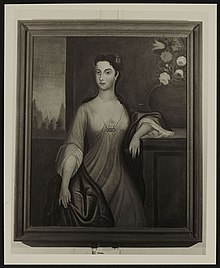Landon Carter
Landon Carter | |
|---|---|
 | |
| Member of the House of Burgesses for Richmond County, Colony of Virginia | |
| In office 1752–1768 Serving with John Woodbridge | |
| Preceded by | William Fauntleroy |
| Succeeded by | Thomas Glasscock |
| Personal details | |
| Born | August 18, 1710 Coromaton plantation, Colony of Virginia |
| Died | December 22, 1778 Virginia |
| Children | Robert Wormeley Carter and several daughters |
| Parent(s) | Robert Carter I, Elizabeth Landon Willis |
| Relatives | Charles, Robert Carter II of Nomini, George Carter (brothers); John Carter (half-brother) |
| Residence | Sabine Hall |
| Education | in England |
| Occupation | planter, politician |
Col. Landon Carter, I (August 18, 1710 – December 22, 1778) was an American planter and burgess for
Early life and schooling
Landon Carter was the son of
Family connections and personal life

"King" Carter died in 1732, and upon reaching legal age, Landon inherited a portion of his father's estate. He would marry three times, each time within the First Families of Virginia.[2] He survived all three wives and increased his landholdings (which he farmed using enslaved labor) and siring several children. Shortly after reaching legal age, Carter married his first wife, Elizabeth Wormeley, daughter of burgess Ralph Wormeley. She died in 1740, but gave birth to Robert Wormeley Carter, who had at times a rocky relationship with his father, but ultimately followed a similar career path. In 1742, Landon married Maria Byrd, the 15 year old daughter of William Byrd II, who died two years later. Carter married his third wife, Elizabeth Beale, in 1746, and decided not to remarry again after her death.[3]
Like his father, Carter arranged favorable marriages for his progeny among the First Families of Virginia.[4] Carter's daughter Maria, married Robert Beverley, son of Colonel William Beverley and Elizabeth Bland. He was named after his paternal grandfather. The Beverleys were indirectly descended from Pocahontas through their marriage to the Randolphs.[5]
Career
Shortly after his first marriage, Carter settled on lands he had inherited in Richmond County. He owned properties in eight Virginia counties. In his diary he drew a distinction between his practices as a planter (producing tobacco) and as a farmer (with other crops and more scientific investigation).[6]
Beginning in 1734, Carter built a mansion,
Like his father, Carter was active in local affairs, and ultimately became probably the most politically successful of all his siblings, although his slightly older brother Charles Carter of Cleve would serve more terms in the House of Burgesses. Following two unsuccessful attempts to become one of Richmond County's two (part-time) representatives in the House of Burgesses, Carter succeeded in 1752, then kept winning re-election from 1752 until defeated in 1768.[8][9] In 1764, his brother Charles Carter of Cleve, who represented King George County (where he too ran plantations, and produced wine as well as tobacco), had died. Landon helped raise his then under-aged nephews. Following the death of his third wife and increased British taxation after French and Indian War, Carter became a prolific pamphleteer. He also continued to correspond with men interested in scientific agriculture throughout the colonies. In 1769 he was elected a member of the American Philosophical Society in Philadelphia.[10]
Death and legacy
Carter was survived by several children, of whom his firstborn son
References
- Encyclopedia Virginia
- LCCN 83081512.
- ISBN 0-19-518908-6.
- ^ Carlton, pp. 240-368
- ^ Louise Pecquet du Bellet, Some Prominent Virginia Families, p. 161
- ^ Isaac p.
- ISBN 0-8018-5986-7.
- ^ Cynthia Miller Leonard, The Virginia General Assembly 1619-1978 (Richmond: Virginia State Library 1978, pp. 85, 87, 89, 93, 96
- ^ encyclopediavirginia
- ^ Bell, Whitfield J., and Charles Greifenstein, Jr. Patriot-Improvers: Biographical Sketches of Members of the American Philosophical Society. 3 vols. Philadelphia: American Philosophical Society, 1997, 3:616–619.
- ^ Isaac p.
- ISBN 0-8014-3521-8.
- ^ "Carter Family Papers". Special Collections Research Center, Swem Library, College of William and Mary. Retrieved 22 January 2011.
- ^ "Carter, Landon".
Further reading
- Landon Carter, The diary of Colonel Landon Carter of Sabine Hall, 1752-1778. Edited, with an introd., by Jack P. Greene (Charlottesville, Published for the Virginia Historical Society [by] the University Press of Virginia, 1965).
External links
Archival Records
- "Landon Carter Advertisement for Runaway Slave", at Virginia Memory
